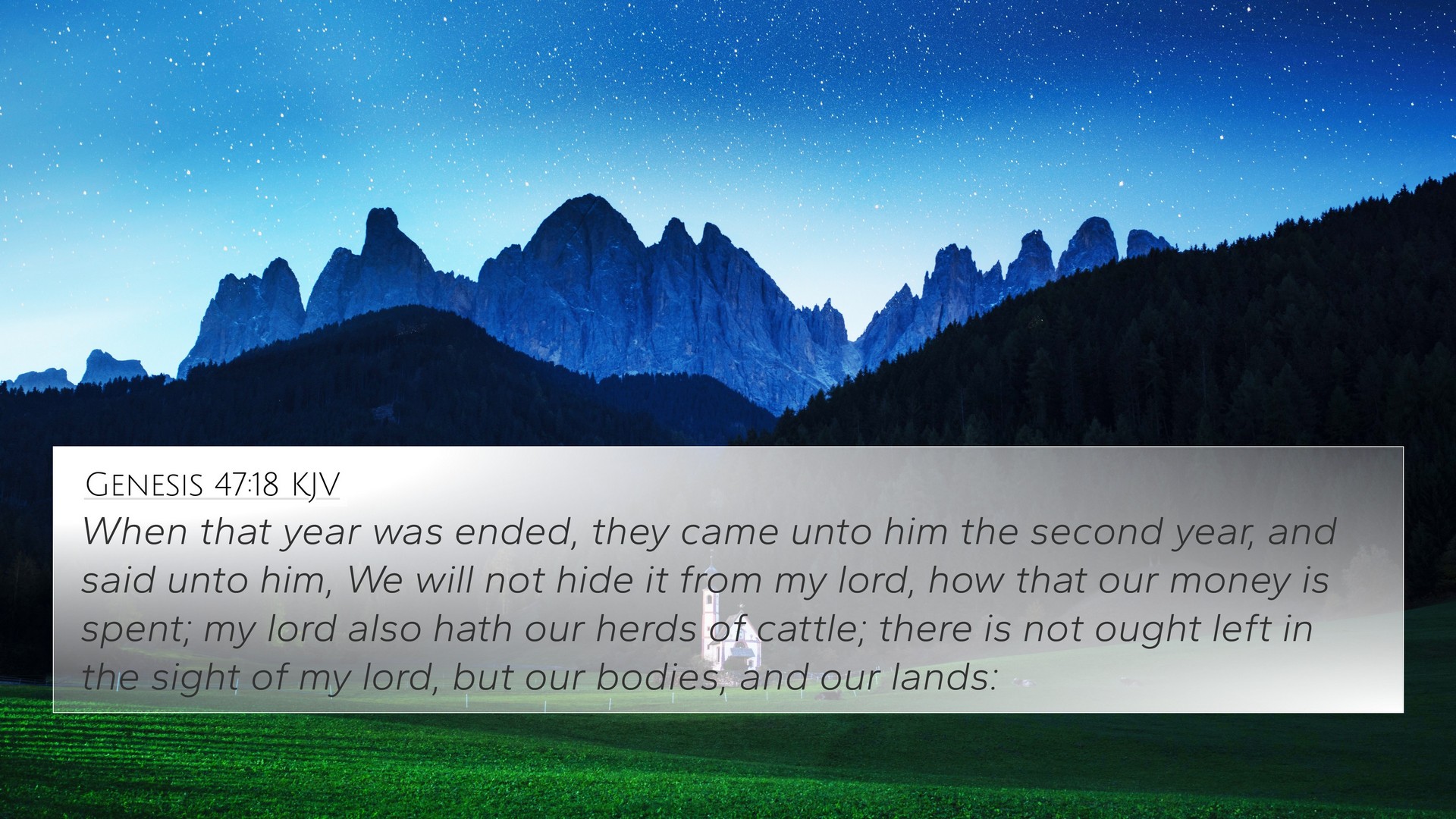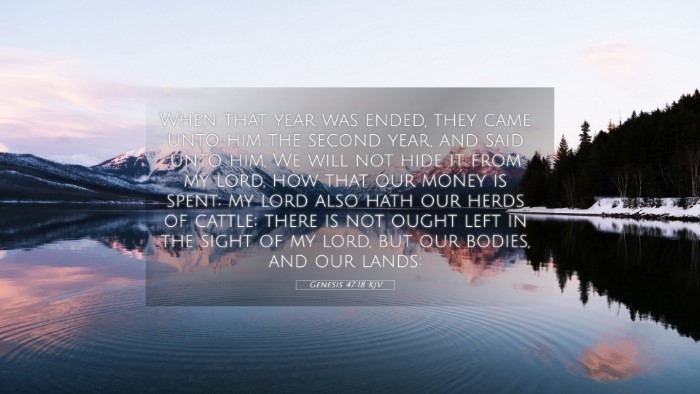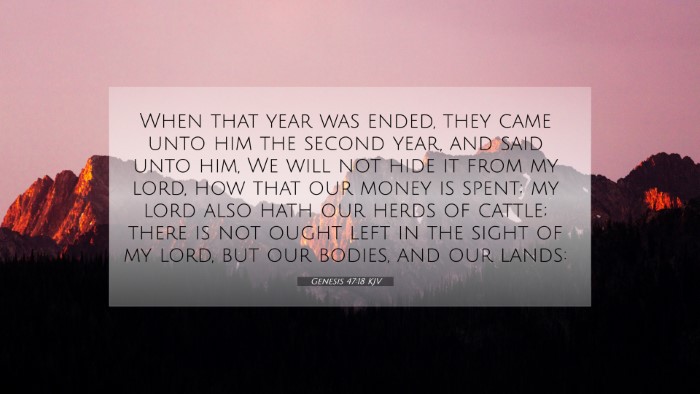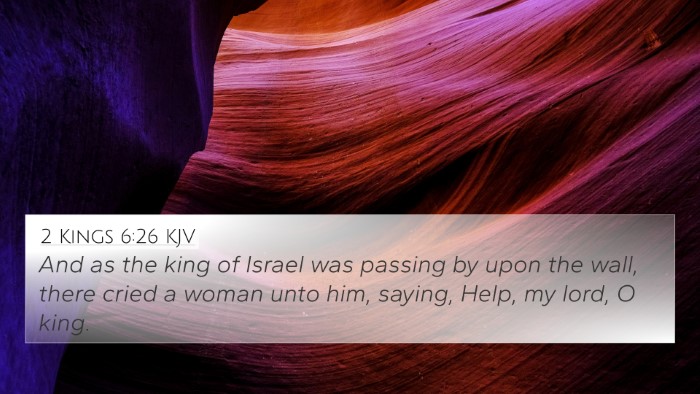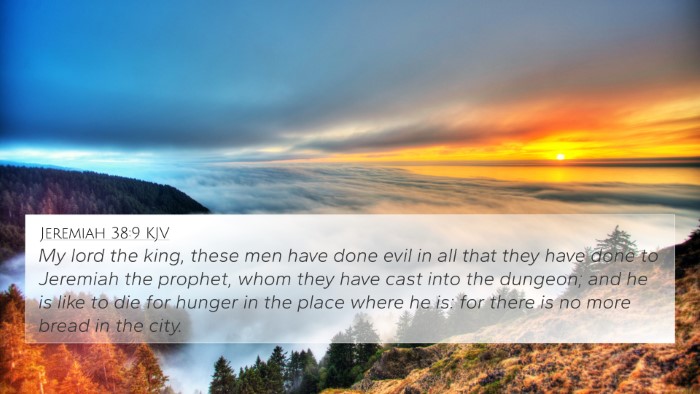Meaning and Interpretation of Genesis 47:18
Genesis 47:18 states: “When that year was ended, they came unto him the second year, and said unto him, We will not hide it from my lord, how that our money is spent; my lord also hath our herds of cattle; there is not ought left in the sight of my lord, but our bodies and our lands.” This verse is part of a narrative that details the economic circumstances of the Egyptians during a time of famine and their interactions with Joseph, who was appointed by Pharaoh to manage the food supplies.
Contextual Understanding
This verse captures a poignant moment in the story of the seven years of plenty followed by seven years of famine. The Israelites, alongside the Egyptians, are facing dire economic straits. The submission of their resources to Joseph reflects both desperation and the unfolding plan of God in providing sustenance during the famine. The act of surrendering their bodies and land signifies a complete dependence on God's provision through Joseph.
Commentary Insights
- Matthew Henry's Commentary: Henry emphasizes the humility and desperation of the Egyptians as they acknowledge their depleted resources, revealing a faith-driven dependency on Joseph. He views this moment as significant, as their honesty in their struggles symbolizes a larger theme of surrender to divine authority and the care of God through His appointed leaders.
- Albert Barnes' Commentary: Barnes notes the cultural and economic implications of the Egyptians selling themselves into servitude. He points out that during the famine, the Egyptians come to recognize the wisdom inherent in Joseph's governance. Their decision to turn to Joseph indicates a shift from self-sufficiency to trust in divinely appointed leadership for survival.
- Adam Clarke's Commentary: Clarke provides a broader theological insight, looking at the nature of providence reflected in this scenario. He sees Joseph’s role as a prefiguration of Christ, depicting how the Savior provides for the needs of His people. Clarke highlights the moral necessity of coming to terms with our own limitations and seeking help from those God has placed in authority.
Cross-References and Thematic Connections
Genesis 47:18 can be cross-referenced with several other biblical passages, showcasing the interconnectivity of Scripture. Some related verses include:
- Exodus 3:7-10: God hears the cry of His people and appoints Moses to lead them, similar to how Joseph leads during the famine.
- Matthew 5:3: "Blessed are the poor in spirit," highlighting the importance of humility and recognition of need, which mirrors the Egyptians’ stance in Genesis 47:18.
- James 4:10: "Humble yourselves in the sight of the Lord, and he shall lift you up." This speaks to the surrender that the Egyptians exhibit before Joseph.
- John 6:35: Jesus identifies Himself as the Bread of Life, indicating the spiritual sustenance that parallels the physical sustenance provided by Joseph in Genesis.
- Philippians 4:19: "But my God shall supply all your need according to his riches in glory by Christ Jesus," indicating divine provision in times of need.
- Genesis 41:30-31: Earlier verses describing the famine directly leading to the need for Joseph’s administration.
- Psalm 37:25: "I have been young, and now am old; yet have I not seen the righteous forsaken, nor his seed begging bread," emphasizing God's provision.
Theological Implications
The themes extracted from Genesis 47:18 reveal profound theological implications about God’s providence, human frailty, and the recognition of authority. These interactions in the narrative serve to illustrate God’s sovereign hand in guiding His people, not only in times of plenty but also during periods of scarcity.
Lessons on Surrender and Trust
The key lesson from this passage is the importance of acknowledging our limitations and the necessity of placing our trust in God’s provision. The Egyptians' desperation led them to submit completely to Joseph, demonstrating a profound truth about human experiences of vulnerability and reliance on God’s agents for sustenance and guidance.
Using Cross-References for Deeper Study
For those engaged in Bible study, understanding how to identify and utilize cross-referencing tools can deepen one’s comprehension of Scripture. Consider employing a Bible concordance or a cross-reference guide to enhance your study of Genesis 47:18 and its connections with other biblical texts.
Effective cross-referencing Bible study methods allow for a thematic exploration that sheds light on patterns and narratives resonating across both the Old and New Testaments, enhancing the holistic understanding of God’s word.
Conclusion
In summary, Genesis 47:18 encapsulates vital themes of need, surrender, and divine provision, pointing to a broader narrative of God’s care for humanity. By utilizing biblical cross-references, one can uncover rich interconnections that illuminate the text and provide context and understanding to both the historical and spiritual messages contained within the Scriptures.
